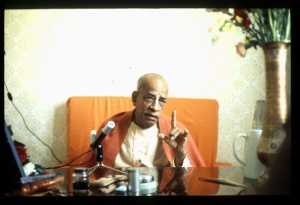SB 9.4.15-16: Difference between revisions
m (1 revision(s)) |
(Vanibot #0018 edit: make synonym terms in Sanskrit italic in SB - Vanisource) |
||
| Line 1: | Line 1: | ||
{{info | {{info | ||
|speaker= | |speaker=Śukadeva Gosvāmī | ||
|listener=King | |listener=King Parīkṣit | ||
}} | }} | ||
[[Category:Srimad-Bhagavatam - Canto 09 Chapter 04]] | |||
[[Category:Bhagavatam Verses Spoken by Sukadeva Gosvami - Vanisource|090415]] | |||
<div style="float:left">'''[[Srimad-Bhagavatam]] - [[SB 9|Ninth Canto]] - [[SB 9.4: Ambarisa Maharaja Offended by Durvasa Muni|Chapter 4: Ambarīṣa Mahārāja Offended by Durvāsā Muni]]'''</div> | |||
<div style="float:right">[[File:Go-previous.png|link=SB 9.4.14]] '''[[SB 9.4.14]] - [[SB 9.4.17]]''' [[File:Go-next.png|link=SB 9.4.17]]</div> | |||
{{RandomImage}} | |||
==== TEXTS 15-16 ==== | ==== TEXTS 15-16 ==== | ||
<div | <div class="verse"> | ||
śrī-śuka uvāca | :śrī-śuka uvāca | ||
ambarīṣo mahā-bhāgaḥ | :ambarīṣo mahā-bhāgaḥ | ||
sapta-dvīpavatīṁ mahīm | :sapta-dvīpavatīṁ mahīm | ||
avyayāṁ ca śriyaṁ labdhvā | :avyayāṁ ca śriyaṁ labdhvā | ||
vibhavaṁ cātulaṁ bhuvi | :vibhavaṁ cātulaṁ bhuvi | ||
mene 'tidurlabhaṁ puṁsāṁ | |||
sarvaṁ tat svapna-saṁstutam | :mene 'tidurlabhaṁ puṁsāṁ | ||
vidvān vibhava-nirvāṇaṁ | :sarvaṁ tat svapna-saṁstutam | ||
tamo viśati yat pumān | :vidvān vibhava-nirvāṇaṁ | ||
:tamo viśati yat pumān | |||
</div> | </div> | ||
| Line 22: | Line 28: | ||
==== SYNONYMS ==== | ==== SYNONYMS ==== | ||
<div | <div class="synonyms"> | ||
śrī-śukaḥ | ''śrī-śukaḥ uvāca''—Śrī Śukadeva Gosvāmī said; ''ambarīṣaḥ''—King Ambarīṣa; ''mahā-bhāgaḥ''—the greatly fortunate king; ''sapta-dvīpavatīm''—consisting of seven islands; ''mahīm''—the whole world; ''avyayām ca''—and inexhaustible; ''śriyam''—beauty; ''labdhvā''—after achieving; ''vibhavam ca''—and opulences; ''atulam''—unlimited; ''bhuvi''—in this earth; ''mene''—he decided; ''ati-durlabham''—which is rarely obtained; ''puṁsām''—of many persons; ''sarvam''—everything (he had obtained); ''tat''—that which; ''svapna-saṁstutam''—as if imagined in a dream; ''vidvān''—completely understanding; ''vibhava-nirvāṇam''—the annihilation of that opulence; ''tamaḥ''—ignorance; ''viśati''—fallen into; ''yat''—because of which; ''pumān''—a person. | ||
</div> | </div> | ||
| Line 29: | Line 35: | ||
==== TRANSLATION ==== | ==== TRANSLATION ==== | ||
<div | <div class="translation"> | ||
Śukadeva Gosvāmī said: Mahārāja Ambarīṣa, the most fortunate personality, achieved the rule of the entire world, consisting of seven islands, and achieved inexhaustible, unlimited opulence and prosperity on earth. Although such a position is rarely obtained, Mahārāja Ambarīṣa did not care for it at all, for he knew very well that all such opulence is material. Like that which is imagined in a dream, such opulence will ultimately be destroyed. The King knew that any nondevotee who attains such opulence merges increasingly into material nature's mode of darkness. | Śukadeva Gosvāmī said: Mahārāja Ambarīṣa, the most fortunate personality, achieved the rule of the entire world, consisting of seven islands, and achieved inexhaustible, unlimited opulence and prosperity on earth. Although such a position is rarely obtained, Mahārāja Ambarīṣa did not care for it at all, for he knew very well that all such opulence is material. Like that which is imagined in a dream, such opulence will ultimately be destroyed. The King knew that any nondevotee who attains such opulence merges increasingly into material nature's mode of darkness. | ||
</div> | </div> | ||
| Line 36: | Line 42: | ||
==== PURPORT ==== | ==== PURPORT ==== | ||
<div | <div class="purport"> | ||
For a devotee material opulence is insignificant, whereas for a nondevotee material opulence is the cause of increasing bondage, for a devotee knows that anything material is temporary, whereas a nondevotee regards the temporary so-called happiness as everything and forgets the path of self-realization. Thus for the nondevotee material opulence is a disqualification for spiritual advancement. | For a devotee material opulence is insignificant, whereas for a nondevotee material opulence is the cause of increasing bondage, for a devotee knows that anything material is temporary, whereas a nondevotee regards the temporary so-called happiness as everything and forgets the path of self-realization. Thus for the nondevotee material opulence is a disqualification for spiritual advancement. | ||
</div> | </div> | ||
__NOTOC__ | |||
<div style="float:right; clear:both;">[[File:Go-previous.png|link=SB 9.4.14]] '''[[SB 9.4.14]] - [[SB 9.4.17]]''' [[File:Go-next.png|link=SB 9.4.17]]</div> | |||
__NOTOC__ | |||
__NOEDITSECTION__ | |||
Revision as of 08:50, 1 December 2017

A.C. Bhaktivedanta Swami Prabhupada
TEXTS 15-16
- śrī-śuka uvāca
- ambarīṣo mahā-bhāgaḥ
- sapta-dvīpavatīṁ mahīm
- avyayāṁ ca śriyaṁ labdhvā
- vibhavaṁ cātulaṁ bhuvi
- mene 'tidurlabhaṁ puṁsāṁ
- sarvaṁ tat svapna-saṁstutam
- vidvān vibhava-nirvāṇaṁ
- tamo viśati yat pumān
SYNONYMS
śrī-śukaḥ uvāca—Śrī Śukadeva Gosvāmī said; ambarīṣaḥ—King Ambarīṣa; mahā-bhāgaḥ—the greatly fortunate king; sapta-dvīpavatīm—consisting of seven islands; mahīm—the whole world; avyayām ca—and inexhaustible; śriyam—beauty; labdhvā—after achieving; vibhavam ca—and opulences; atulam—unlimited; bhuvi—in this earth; mene—he decided; ati-durlabham—which is rarely obtained; puṁsām—of many persons; sarvam—everything (he had obtained); tat—that which; svapna-saṁstutam—as if imagined in a dream; vidvān—completely understanding; vibhava-nirvāṇam—the annihilation of that opulence; tamaḥ—ignorance; viśati—fallen into; yat—because of which; pumān—a person.
TRANSLATION
Śukadeva Gosvāmī said: Mahārāja Ambarīṣa, the most fortunate personality, achieved the rule of the entire world, consisting of seven islands, and achieved inexhaustible, unlimited opulence and prosperity on earth. Although such a position is rarely obtained, Mahārāja Ambarīṣa did not care for it at all, for he knew very well that all such opulence is material. Like that which is imagined in a dream, such opulence will ultimately be destroyed. The King knew that any nondevotee who attains such opulence merges increasingly into material nature's mode of darkness.
PURPORT
For a devotee material opulence is insignificant, whereas for a nondevotee material opulence is the cause of increasing bondage, for a devotee knows that anything material is temporary, whereas a nondevotee regards the temporary so-called happiness as everything and forgets the path of self-realization. Thus for the nondevotee material opulence is a disqualification for spiritual advancement.